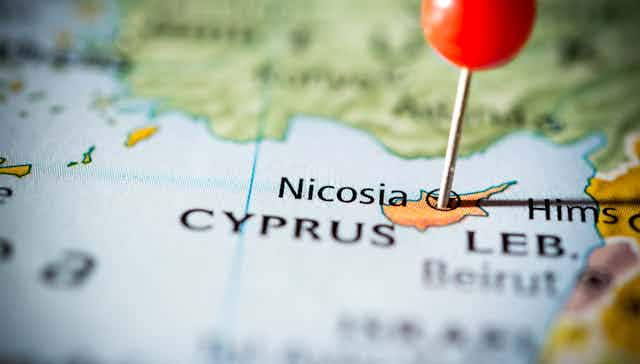For many, the decades-long conflict between Greek Cypriots and Turkish Cypriots over how they can live together is a graveyard of diplomatic effort. The issue dates back to the 1950s, when the demise of British colonialism in the island raised questions about power-sharing in the two communities. Since then no solution has managed to offer long-term stability for a country split down the middle.
This could be about to change. Talks encouraged by outgoing United Nations secretary general Ban Ki Moon have sparked optimism that his successor Antonio Guterres might the first to be free of the headache that is the “Cyprus problem”.
This optimism is not unfounded if we look at who is at the helm of this effort. This new round of negotiations commenced when Mustafa Akinci was elected leader of the Turkish Cypriots last April. Akinci is by far the most pro-solution leader the Turkish Cypriots have ever had. His Greek Cypriot counterpart, Nicos Anastasiades, is also a committed moderate when it comes to the resolution of the dispute. He was in fact leader of Democratic Rally, the only major Greek Cypriot party to have supported the Annan Plan – the 2004 UN proposal for a Cyprus federation that was eventually rejected by the Greek Cypriots in the polls.
When the two leaders and their teams met in Switzerland’s Mont Pelerin recently to intensify peace talks on issues like the economy and governance – but especially on the issue of territory – the UN special adviser on Cyprus, Espen Barth Eide, praised the commitment and bravery of the two leaders and signalled that “significant progress” had been made. The leaders have agreed for one more week of talks starting November 20 in Geneva.

Territory is important
If an agreement is achieved on the territory front, then one of the biggest challenges is sorted. The issue has material as well as emotional significance. Greek Cypriots in particular are looking for a return of some of the territories now under Turkish Cypriot control, which will allow their refugees to return to their properties.
But, while the UN wants the two Cypriot communities to remain “owners” of the talks, there is no question that Turkey is a major player. Turkey has always supported the Turkish Cypriots in the north of the island, first with mostly diplomatic assistance to promote their aims – for example, when the Greek Cypriots led the anti-colonial movement and tried for union with Greece.
Since the division of the island, which started in the sixties and was finalised with the 1974 war, Turkey’s involvement has been far greater. It has essentially subsidised the unrecognised state in the north and stationed forces there. So, one of the big questions is if and how Turkey will leave the island should a federation be established. Turkish Cypriot insecurities about being a minority, rooted in years of conflict with the Greek Cypriots, leaves many in the north seeing Turkey’s military as somehow a protection. But this is anathema for the Greek Cypriots.

Political games
On the other hand, while Ankara is officially supporting the talks, it is really difficult to predict the role they could play in the crucial weeks and months ahead, given the instability in the country. Often, troubles at home have pushed the Turkish leadership to be constructive in Cyprus so as to improve their international reputation but whether this will be the case again remains unclear. We are, after all, watching unprecedented events in Turkey at the moment.
Turkey’s role in Cyprus has always been linked to the country’s relation to the European Union. For years, Ankara has been relatively flexible on the Cyprus problem, the resolution of which is a condition for its EU accession. But with the process of accession practically dead – and amid calls from EU diplomats to kill it officially – Turkey might have less incentive to contribute to a resolution.
The recent European Commission annual report on Turkey’s accession progress was very critical of its domestic situation and this has reportedly made Greek Cypriots think their hand in the negotiations is strengthened. To them it is now even easier to argue that Turkey should not be a “guarantor power”, an idea that comes from the post-independence institutional set-up in bi-communal Cyprus and which is used as an argument for stationing troops there.

The People Decide
Ultimately, the fate of Cyprus will be decided by its people, who will approve or reject at the ballot box any potential agreement that the leaders of the talks might secure. It is for that reason that this week’s break in the negotiations might be welcome.
The Greek Cypriot leader Anastasiades says he wants to discuss with the rest of political forces in his community before negotiations move forward. He might also seek to consult with Athens, which is soon hosting outgoing US President Barack Obama. Despite frustrating some Turkish Cypriots, who are eager for a solution sooner than later, this pause could be crucial for a successful resolution.
Keeping the communities in Cyprus at the heart of the process, especially in the south where political forces are too sceptical of a solution, is essential for gain eventual support. Turkish Cypriot civil society is getting organised in favour of reunification, just like they did in 2004, when they successfully mobilised people to support the resolution plan. But, as before, things are much slower in the south. As the leaders will start preparing their suitcases for the new round of talks in Geneva, Greek Cypriots who want reunification might need to start organising too.

